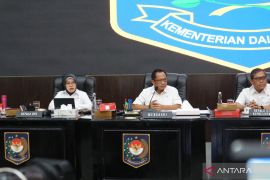They explored the area and enjoyed the peace and serenity of Ambon city, known as the centre of sectarian conflicts in Maluku province from 1999 to 2002.
Visitors were seen taking photographs of the monument and the place. They will most probably tell their friends that they had visited the peaceful Maluku provincial city of Ambon, particularly the World Peace Gong monument.
Certainly, they will show the pictures they had taken and rave about how much they enjoyed their visit.
Some of the tourists also visited the Marta Christina Tiahahu monument at the scenic Karangpanjang Hill.
On top of Karangpanjang Hill, visitors enjoyed the fragrance of flowers, gentle breeze, chirping of the birds, and the grandeur of Ambon Bay separating the peninsulas of Leihitu and Leitimur.
"Ambon is magnificent, particularly at night, with the lights twinkling on the hills around the city and along the shoreline of the bay," said Gwendoline, a visitor from Jakarta.
In 2009, the World Peace Gong was erected in Ambon city centre to remind the people of Maluku and the visitors of a fundamental need for peace and security.
On the surface of the gong, national flags of all countries around the world and the symbols pertaining to religions, including Christianity, Islam, Judaism, Buddhism, Hinduism, and others, have been printed.
According to Florence Sahusilawane, spokesperson for the Maluku Culture and Tourism Office, the gong has been attracting a lot of local and foreign tourists.
She noted that the 34th world peace gong was set up in the centre of Ambon to inform the world that the area is safe for tourists.
Florence said the World Peace Gong has been set up in the Maluku provincial city of Ambon instead of Indonesia`s capital city because peace and security has been restored in the province after a three-year sectarian violence.
"The World Peace Gong in Ambon will inform the world that Maluku is safe and peaceful; now, both local and foreign tourists can visit the province," she noted.
Since Ambon is now safe and locals are friendly, tourists from all over the world can enjoy the beauty of this tropical paradise and its rich cultural heritage.
Therefore, Maluku`s Governor Karel Albert Ralahalu has urged all public elements in the province to maintain and preserve the environment that is stable and secure so that development can occur as planned and expected.
"We have to appreciate all public elements here because under the coordination of military and police forces, they are able to create an environment that is peaceful, secure, and stable," said Ralahalu.
Locals have become divided along religious lines because of the sectarian conflict that raged in Maluku province from early 1999 to 2002.
During that time, between five thousand and eight thousand people were killed and 500 thousand others displaced from their homes.
Houses of worship were specifically targeted and more than 100 mosques and churches were either destroyed or damaged.
During the first 15 months of the conflict, fights between the two groups, largely cyclical reprisals, resulted in a more or less equal number of fatalities on each side.
The apparent spark that led to the outbreak of conflict was an argument in Ambon city between a Christian public transport driver and at least one Muslim passenger.
The argument led to a brawl and several days of mob violence, which spread quickly to other islands, thus beginning the cyclical pattern.
However, Governor Ralahalu urged the people to become closer despite their differences and diversity.
"The differences and diversity are something beautiful and can help strengthen brotherhood in the frame of the ancestral culture of Pela-Gandong for the betterment of Maluku," said Ralahalu.
Pela is based on friendship between two villages and Gandong indicates brotherhood between two or more villages based on genealogical links.
Thus, Pela-Gandong is traditional wisdom of the Maluku people, underlining that all men are related to each other, and therefore, they should always live in peace.
According to Pela-Gandong, if a group of people is building a house of worship, people belonging to another group must help and support the construction.
Ralahalu said the world should know that the Pela-Gandong cultural value is very much alive in Maluku and has become stronger since the end of the communal conflict some 14 years ago. (*)
Reporter: Otniel Tamindael
Editor: Otniel Tamindael
Copyright © ANTARA 2013











